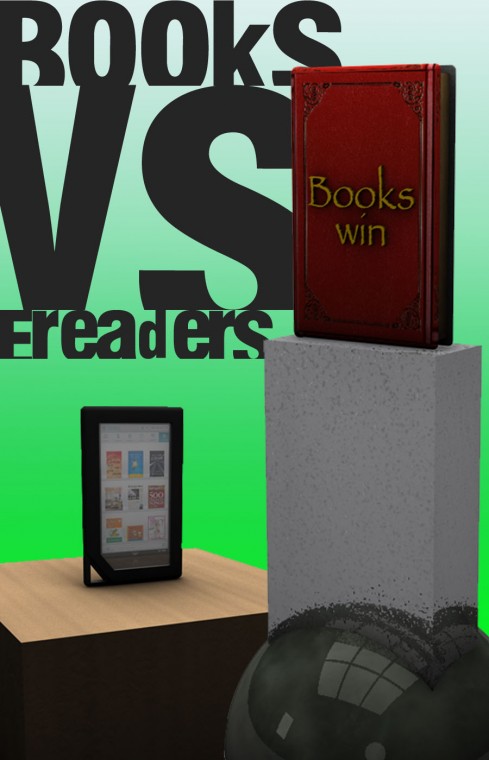E-readers destroy tradition
March 9, 2011
I have a love affair with books. The musty smell of old pages is comforting, like spending the evening with a long-lost friend. The crisp, clean excitement of a brand-new book is like a present waiting to be unwrapped.
Paperbacks become tattered, pages torn, with little notes written in the tight margins to remind me later of the thoughts and feelings I had the first time I read it, like a journal hidden among the words of others. Hardbacks sit on the shelf, stoic in their enduring nature, yearning to be opened, explored and loved.
So it was a sad day when Borders Group, Inc. announced it was filing for Chapter 11 bankruptcy and closing more than 200 stores nationwide.
Borders, like many other companies, is struggling to survive in the bleak economic climate that has already claimed the life of so many other businesses.
It has fierce competition from online retailers like Amazon.com that don’t have the brick-and-mortar overhead of the traditional bookstore.
However, price competition is not the only enemy of the bookstore. E-readers are moving into the market, forcing booksellers to rethink their strategies to keep up with technology.
Now, instead of leisurely browsing the shelves of a bookstore and admiring the colorful and creative covers, people can instantly download a book to a device such as a Kindle or an iPad wherever they are.
Tony Gragg, a Borders employee, has seen an increasing interest in e-readers over the last two years. He said older people buy the devices most often because they like the convenience of the light weight and portability. Also, a lot of them just don’t have room for more books, he said.
E-readers can certainly be convenient. Most of them can hold 1,000 or more books. They are great for traveling and for those who enjoy having content at the drop of a dime.
But, some people don’t want to stare at a digital screen for any longer than necessary.
“I’m already on the computer all day, every day, so if I’m going to read for pleasure I’d rather have a traditional book,” said Ivania Enriquez, senior psychology major.
E-readers also take away the enjoyment of spending an afternoon at the bookstore, sipping coffee and discovering new authors.
When my son was little, we would spend Sunday afternoons at Borders, reading and giggling over the funny pictures in the children’s section. It was a time to bond and to instill in him the pleasure of taking your time, enjoying the adventures hidden within the pages.
The transition to digital books is also entering the textbook market, albeit at a slower pace.
Pam Parsons, director of the Hornet Bookstore, said textbooks are a better candidate for electronic versions than general books, but publishers aren’t moving very quickly to make the change.
“The impermanence of textbooks makes them the best candidate for electronic versions,” Parsons said. “It wouldn’t just be a convenience, but a benefit.”
Textbooks are constantly being updated, forcing students to purchase the newest editions at a higher cost than used books. If they were offered in an electronic format updates could be done automatically, saving students money, Parsons said.
Parsons hopes the push toward e-books in the general market will be like a vacuum, sucking the textbook market in with it.
There are clearly benefits to having your entire library neatly packaged into one little device. But scrolling through the pages of an e-book just isn’t the same as flipping printed pages, and it can be devastating to lose everything if your device is broken or stolen.
As I browse the overflowing bookshelf in my room, reminiscing about where I was in life when I acquired each of them, I realize future generations may not know the pleasure that comes from the tactile experience of holding a book in your hands.
It makes me sad. I’m sure there’s a book in the self-help section of the bookstore to get me through it.
Kelly Walters can be reached at [email protected].
















































































































































